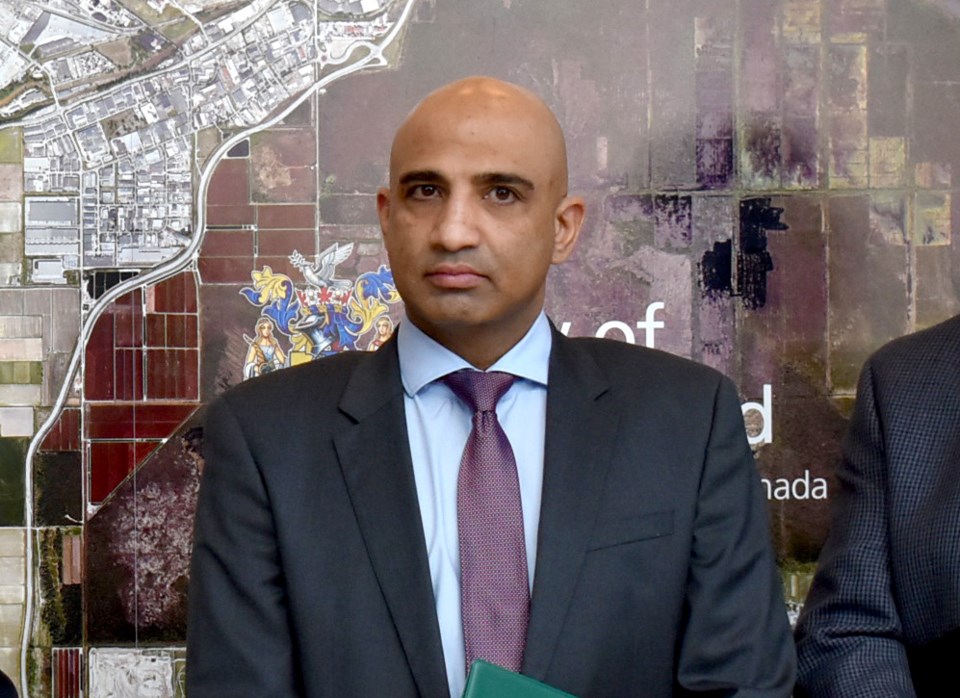Parm Bains, member of Parliament for Steveston-Richmond East was back in the House of Commons last week, and he made a point of highlighting that March is Kidney Health Month.
There was a very personal reason Bains wanted to bring this up as he himself just received a new kidney last August.
Bains had just passed a six-month ban by his doctor on any out-of-province travel after the transplant and was finally able to be back in Parliament in person after working virtually post-surgery.
Bains found out 15 years ago that he was missing a kidney – something he’d never noticed before.
During a routine work-related physical, his blood pressure was “oddly high,” so his doctor ordered a battery of tests, including an ultrasound, which was when the missing kidney was discovered.
Apparently, one in 100,000 Canadians has only one kidney.
This discovery was followed by years of maintaining his health, with the assumption that one day he would probably need a new kidney.
Shortly after being elected as the member of Parliament for Steveston- Richmond East, Bains started getting extremely fatigued.
His one existing kidney was starting to deteriorate.
Travelling was taking a toll and, outside of his days in Parliament, he just slept in his hotel room in Ottawa.
That’s when his doctor said it was time to look into getting a new kidney.
Luckily, Parliament still had in place its virtual system, and Bains was able to attend meetings online and keep up with his constituency work while he underwent dialysis and worked through the transplant system to get a new kidney.
Bains’ sister wanted to donate a kidney to him, but, unfortunately, she wasn’t a match.
So, the brother and sister started looking into a kidney donation system that allows people to donate to someone else so that their loved one can get a kidney, called the “paired exchange program.”
“Even if you don’t match a family member, you can join the process and give to someone and someone can give to you so you’re helping more people,” Bains said. “People struggle to find someone within the family.”
This was supposed to happen in June, but the “chain,” which can have up to 16 people in it, fell apart, so Bains was waiting for the next round in October.
In the meantime, he was going to VGH three nights a week to have dialysis while he slept, all the while doing his work as an MP virtually and in the community.
While Bains and his sister were on the kidney paired exchange list, out of the blue Bains received a call in August that they had found a very good match for him.
He needed to get to the hospital the same day and the surgery was planned for the next day.
“The next day, I had a new kidney and it worked really well and I’ve been really strong since,” Bains said, adding his new kidney is working at 75 per cent.
One in 10 Canadians live with kidney disease
Kate Chong carries a piece of her husband around with her wherever she goes.
At the age of 25, she was diagnosed with kidney disease, something doctors suspected might have come from an untreated urinary tract infection.
At 32, with her kidneys finally deteriorating to the point where she needed either dialysis or a new kidney, her husband was identified as a match.
A living donation usually lasts 15 to 20 years, and for Chong, getting that kidney meant she and her husband could set life goals and plan a family.
Since getting her new kidney, Chong has had two children.
While her pregnancies were considered high-risk, they both went well and she has now has a daughter and a son, and, furthermore, she was able to breastfeed them without any risks from the medications she’s on.
One in 10 Canadians are living with kidney disease, and 45 per cent of those are under the age of 65.
Chong, who works as the manager of patient services with the Kidney Foundation, encourages everyone to watch out for signs and symptoms of kidney disease.
The difficult issue is that some people can have 80 per cent diminished kidney function before they show symptoms.
So, knowing your risk factors helps, Chong noted, adding some ethnic groups are more susceptible, namely, Asians, South Asians, Indigenous people and people of African descent.
Also, people who have diabetes and high blood pressure are at higher risk, she added.
There is an online tool where anyone can check their risk factors.
For those who are diagnosed with kidney disease, Chong said there are “amazing” resources and medical professionals to help them along their “kidney journey.”
“Every situation and journey is different,” she said. “That’s where the medical team comes in.”
Many people aren’t aware of the important functions kidneys play in one’s health, Chong said, and she acknowledged before she was diagnosed with kidney disease, she hadn’t thought much about these organs, especially at such a young age.
After her diagnosis, there were “adjustments” she needed to make.
“There are good days and there are bad days,” she said.
Although she was fairly healthy, she had work to stabilize her kidneys and keep them going for as long as possible.
Chong recommends doing an online kidney disease risk assessment, talking to a family doctor about whether there’s a need for blood tests, and maintaining a healthy lifestyle.
“Be your best advocate,” she said.
Chong also recommends people think about being an organ or transplant donor. To see if you’re on the organ donation list, go to the BC Transplant website.
Resources for those living with kidney disease can be found at the Kidney Wellness Hub and for general information, click here.



